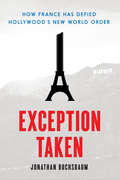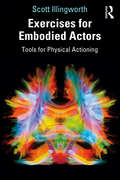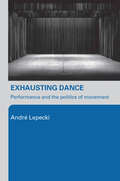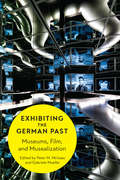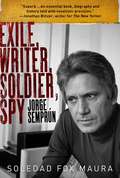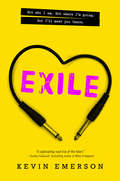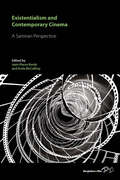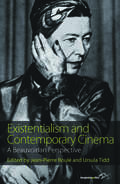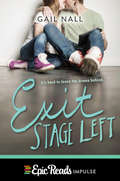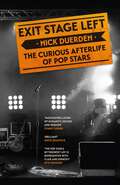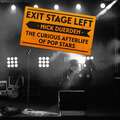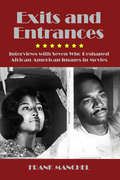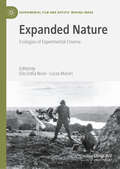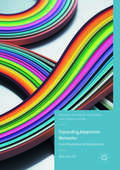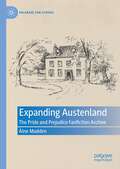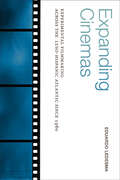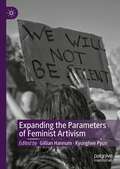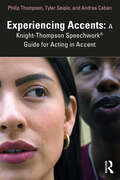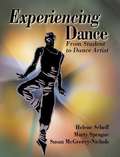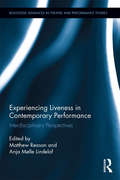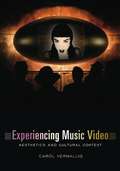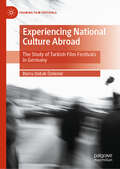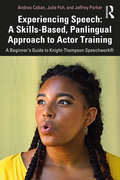- Table View
- List View
Exception Taken: How France Has Defied Hollywood's New World Order (Film and Culture Series)
by Jonathan BuchsbaumIn Exception Taken, Jonathan Buchsbaum examines the movements that have emerged in opposition to the homogenizing force of Hollywood in global filmmaking. While European cinema was entering a steady decline in the 1980s, France sought to strengthen support for its film industry under the new Mitterrand government. Over the following decades, the country lobbied partners in the European Economic Community to design strategies to protect the audiovisual industries and to resist cultural free-trade pressures in international trade agreements. These struggles to preserve the autonomy of national artistic prerogatives emboldened many countries to question the benefits of accelerated globalization.Led by the energetic minister of culture Jack Lang, France initiated a series of measures to support all sectors of the film industry. Lang introduced laws mandating that state and private television invest in the film industry, effectively replacing the revenue lost from a shrinking theatrical audience for French films. With the formation of the European Union in 1992, Europe passed a new treaty (Maastricht) that extended its legal purview to culture for the first time, setting up the dramatic confrontation over the General Agreement on Trade and Tariffs (GATT) in 1993. Pushed by France, the EU fought the United States over the idea that countries should preserve their right to regulate cultural activity as they saw fit. France and Canada then initiated a campaign to protect cultural diversity within UNESCO that led to the passage of the Convention on Cultural Diversity in 2005. As France pursued these efforts to protect cultural diversity beyond its borders, it also articulated "a certain idea of cinema" that did not simply defend a narrow vision of national cinema. France promoted both commercial cinema and art cinema, disproving announcements of the death of cinema.
Exercises for Embodied Actors: Tools for Physical Actioning
by Scott IllingworthExercises for Embodied Actors: Tools for Physical Actioning builds on the vocabulary of simple action verbs to generate an entire set of practical tools from first read to performance that harnesses modern knowledge about the integration of the mind and the rest of the body. Including over 50 innovative exercises, the book leads actors through a rigorous examination of their own habits, links those discoveries to creating characters, and offers dozens of exercises to explore in classrooms and with ensembles. The result is a modern toolkit that empowers actors to start from their own unique selves and delivers specific techniques to apply on stage and in front of the camera. This step-by-step guide can be used by actors working individually or by teachers crafting the arc of a course, ensuring that students explore in physically engaged and dynamic ways at every step of their process.
Exhausting Dance: Performance and the Politics of Movement
by Andre LepeckiThe only scholarly book in English dedicated to recent European contemporary dance, Exhausting Dance: Performance and the Politics of Movement examines the work of key contemporary choreographers who have transformed the dance scene since the early 1990s in Europe and the US. Through their vivid and explicit dialogue with performance art, visual arts and critical theory from the past thirty years, this new generation of choreographers challenge our understanding of dance by exhausting the concept of movement. Their work demands to be read as performed extensions of the radical politics implied in performance art, in post-structuralist and critical theory, in post-colonial theory, and in critical race studies. In this far-ranging and exceptional study, Andre Lepecki brilliantly analyzes the work of the choreographers: * Jerome Bel (France)* Juan Dominguez (Spain)* Trisha Brown (US)* La Ribot (Spain)* Xavier Le Roy (France-Germany)* Vera Mantero (Portugal) and visual and performance artists: * Bruce Nauman (US) * William Pope.L (US). This book offers a significant and radical revision of the way we think about dance, arguing for the necessity of a renewed engagement between dance studies and experimental artistic and philosophical practices.
Exhibiting the German Past
by Peter M. Mcisaac Gabriele MuellerWhile scholars recognize both museums and films as sites where historical knowledge and cultural memory are created, the convergence between their methods of constructing the past has only recently been acknowledged. The essays in Exhibiting the German Past examine a range of films, museums, and experiences which blend the two, considering how authentic objects and cinematic techniques are increasingly used in similar ways by both visual media and museums.This is the first collection to focus on the museum-film connection in German-language culture and the first to approach the issue using the concept of "musealization," a process that, because it engages the cultural destruction wrought by modernization, offers new means of constructing historical knowledge and shaping collective memory within and beyond the museum's walls. Featuring a wide range of valuable case studies, Exhibiting the German Past offers a unique perspective on the developing relationship between museums and visual media.
Exile, Writer, Soldier, Spy: Jorge Semprún
by Soledad Fox MauraIn this gripping, authoritative biography, Soledad Fox Maura reveals the tumultuous true-life story of the Oscar-nominated screenwriter responsible for Z and The War Is Over.A man of many faces, Jorge Semprún perfectly personified the struggles and successes of twentieth-century Europe. Semprún enjoyed a privileged childhood as the grandson of Spanish prime minister, Antonio Maura, until his world was shattered by the political strife of the Spanish Civil War and he went into exile. Facing dangers rarely seen outside the action movies of Hollywood, Semprún adopted a resilient spirit and rebel’s stance. He fought with the French Resistance in World War II and survived imprisonment at Buchenwald. After the war, he became an organizing member of the exiled Spanish communist party, maintaining the appearance of a normal civilian life while keeping one step ahead of Francisco Franco's secret police for years. Semprún later put his experiences on paper, becoming an internationally acclaimed author and screenwriter.In this skillfully crafted biography, Semprún's life reads as easily as the best thriller, and has the same addictive rush as watching an edge-of-your-seat mini-series.
Exile: Exile #1
by Kevin EmersonKevin Emerson's Exile combines the swoon-worthy romance of a Susane Colasanti novel with the rock 'n' roll of Eleanor & Park. Summer Carlson knows how to manage bands like a professional--minus the whole falling-for-the-lead-singer-of-the-latest-band part. But Caleb Daniels isn't an ordinary band boy--he's a hot, dreamy, sweet-singing, exiled-from-his-old-band, possibly-with-a-deep-dark-side band boy. She also finds herself at the center of a mystery she never saw coming. When Caleb reveals a secret about his long-lost father, one band's past becomes another's present, and Summer finds it harder and harder to be both band manager and girlfriend. Maybe it's time to accept who she really is, even if it means becoming an exile herself. . . .
Existentialism And Contemporary Cinema
by Enda Mccaffrey Jean-Pierre BoulaAt the heart of this volume is the assertion that Sartrean existentialism, most prominent in the 1940s, particularly in France, is still relevant as a way of interpreting the world today. Film, by reflecting philosophical concerns in the actions and choices of characters, continues and extends a tradition in which art exemplifies the understanding of existentialist philosophy. In a scholarly yet accessible style, the contributors exploit the rich interplay between Sartre's philosophy, plays and novels, and a number of contemporary films including No Country for Old Men, Lost in Translation and The Truman Show, with film-makers including the Dardenne brothers, Michael Haneke, and Mike Leigh. This volume will be of interest to students who are coming to Sartre's work for the first time and to those who would like to read films within an existentialist perspective.
Existentialism and Contemporary Cinema
by Ursula Tidd Jean-Pierre BouleSimone de Beauvoir's work has not often been associated with film studies, which appears paradoxical when it is recognized that she was the first feminist thinker to inaugurate the concept of the gendered 'othering' gaze. This book is an attempt to redress this balance and reopen the dialogue between Beauvoir's writings and film studies. The authors analyse a range of films, from directors including Claire Denis, Michael Haneke, Lucille Hadzihalilovic, Sam Mendes, and Sally Potter, by drawing from Beauvoir's key works such as The Second Sex (1949), The Ethics of Ambiguity (1947) and Old Age (1970).
Exit Stage Left
by Gail NallIn this funny and sweet digital-original novel perfect for fans of Fame, Casey works to find a new passion after her dreams of becoming a Broadway star are ruined.Casey Fitzgerald has always been an actress. She's known it was her destiny ever since she snagged the role of "apple" in her kindergarten's production of The Food Pyramid. But when she doesn't get the lead in her performing arts high school's production of The Sound of Music, she begins to question everything. Not getting the lead means no recommendations, and no recommendations means she can kiss good-bye any chance of getting a scholarship to the prestigious New York College of Performing Arts.After some soul searching and some wise words from her friend Harrison, Casey decides to totally reinvent herself. She's already ditched her on-again off-again boyfriend Trevor and is interested in the new boy at school, so why not start fresh with everything? But every new destiny she tries doesn't seem quite right. And when her best friend, Amanda, who did get the lead, starts hanging out with Trevor, Casey's not sure if she'll ever be able to leave the drama behind.Epic Reads Impulse is a digital imprint with new releases each month.
Exit Stage Left: The curious afterlife of pop stars
by Nick Duerden'Exit Stage Left is the book I've long wanted to read about the PTSD-like after-effects of pop stardom - and Nick Duerden is the perfect writer for the job. The pop star's bittersweet lot - the mass adoration that comes with pop stardom, followed by the bathetic comedown of what inevitably follows - is represented with flair and empathy.' - Pete Paphides, author of Broken Greek'Tragedy, genius, addiction and inspiration: Exit Stage Left is a comprehensive tour through all the ways life can go wrong post-fame (and the few ways it can go right). Funny, poignant and often inspirational.' - Mat Osman 'Duerden finds fascinating layers of humanity, pathos, humour and wisdom in equal measure. A brilliant book, for artists and fans alike.' - Frank Turner'Fame is the brightest candle, but in this brilliant collection of interviews, Nick Duerden answers the question: what does a candle do after it's burned out?' - David Quantick The desire for adulation is a light that never goes out. We live in a culture obsessed by the notion of fame - the heedless pursuit of it; the almost obligatory subsequent fallout. But what's it like to actually achieve it, and what happens when fame abruptly passes, and shifts, as it does, onto someone else?This is the world the pop star is required to inhabit. It's invariably eventful. We know all about them when they're at the top of their game, of course, but they tend to reveal far more of their true selves once they've peaked, and are on their way down. This is the point at which they are at their most heroic, because they don't give up. They keep on striving, keep making music, and refuse simply to ebb away. Some sustain themselves on the nostalgia circuit, others continue to beaver away in the studio, no longer Abbey Road, perhaps, so much as the garden shed. But all of them, in their own individual ways, still dare to dream.Exit Stage Left features tales of drug addiction, bankruptcy, depression and divorce, but also of optimism, a genuine love of the craft, humility and hope. This is a candid, laugh-out-loud and occasionally shocking look at what happens when the brightest stars fall back down to earth.Featuring brand new interviews with the likes of: Bob Geldof, Shaun Ryder, Robbie Williams, Roisin Murphy, Stewart Copeland, Billy Bragg, Wendy James, Alex Kapranos, Joan Armatrading, Leo Sayer, Gary Lightbody, Lisa Maffia, Tim Booth, Bill Drummond, Rufus Wainwright, David Gray, and Justin Hawkins.
Exit Stage Left: The curious afterlife of pop stars
by Nick Duerden'Exit Stage Left is the book I've long wanted to read about the PTSD-like after-effects of pop stardom - and Nick Duerden is the perfect writer for the job. The pop star's bittersweet lot - the mass adoration that comes with pop stardom, followed by the bathetic comedown of what inevitably follows - is represented with flair and empathy.' - Pete Paphides, author of Broken Greek'Tragedy, genius, addiction and inspiration: Exit Stage Left is a comprehensive tour through all the ways life can go wrong post-fame (and the few ways it can go right). Funny, poignant and often inspirational.' - Mat Osman 'Duerden finds fascinating layers of humanity, pathos, humour and wisdom in equal measure. A brilliant book, for artists and fans alike.' - Frank Turner'Fame is the brightest candle, but in this brilliant collection of interviews, Nick Duerden answers the question: what does a candle do after it's burned out?' - David Quantick The desire for adulation is a light that never goes out. We live in a culture obsessed by the notion of fame - the heedless pursuit of it; the almost obligatory subsequent fallout. But what's it like to actually achieve it, and what happens when fame abruptly passes, and shifts, as it does, onto someone else?This is the world the pop star is required to inhabit. It's invariably eventful. We know all about them when they're at the top of their game, of course, but they tend to reveal far more of their true selves once they've peaked, and are on their way down. This is the point at which they are at their most heroic, because they don't give up. They keep on striving, keep making music, and refuse simply to ebb away. Some sustain themselves on the nostalgia circuit, others continue to beaver away in the studio, no longer Abbey Road, perhaps, so much as the garden shed. But all of them, in their own individual ways, still dare to dream.Exit Stage Left features tales of drug addiction, bankruptcy, depression and divorce, but also of optimism, a genuine love of the craft, humility and hope. This is a candid, laugh-out-loud and occasionally shocking look at what happens when the brightest stars fall back down to earth.Featuring brand new interviews with the likes of: Bob Geldof, Shaun Ryder, Robbie Williams, Roisin Murphy, Stewart Copeland, Billy Bragg, Wendy James, Alex Kapranos, Joan Armatrading, Leo Sayer, Gary Lightbody, Lisa Maffia, Tim Booth, Bill Drummond, Rufus Wainwright, David Gray, and Justin Hawkins.
Exit Stage Left: The curious afterlife of pop stars
by Nick Duerden'Exit Stage Left is the book I've long wanted to read about the PTSD-like after-effects of pop stardom - and Nick Duerden is the perfect writer for the job. The pop star's bittersweet lot - the mass adoration that comes with pop stardom, followed by the bathetic comedown of what inevitably follows - is represented with flair and empathy.' - Pete Paphides, author of Broken Greek 'Fame is the brightest candle, but in this brilliant collection of interviews, Nick Duerden answers the question: what does a candle do after it's burned out?' - David QuantickFor fans of music books from David Hepworth, Pete Paphides, Bob Stanley and Craig Brown, as well as thought-provoking human interest stories like Moondust by Andrew Smith, and books by Jon Ronson, Louis Theroux and Stuart Maconie.A quirky, thought-provoking look at the curious afterlife of pop stars.Nick Duerden has spent many years interviewing the most famous musicians on the planet. Without exception, they are at their most interesting when they've peaked, and when they are on their way down. In many ways, this is when these former idols are at their most heroic, too, because they reveal themselves not only to be humane and sensitive, but also still driven to create, to fulfil their lingering dreams, to refuse to live quietly. Some sustain themselves on the nostalgia circuit. Others continue to beaver away in the studio, no longer Abbey Road so much as the garden shed. The desire for adulation is a light that never goes out. We live in a culture obsessed by the notion of fame - the heedless pursuit of it, the almost obligatory subsequent fallout. But what's it like to actually achieve it, and what's it like when fame abruptly passes, and shifts, as it does, onto someone else?These are tales of heroin addiction, bankruptcy, depression, divorce - but also of optimism, a genuine love of the craft, humility and hope. All of which makes EXIT STAGE LEFT a fascinating, laugh-out-loud funny and often shocking look at what happens when the brightest of stars fall down to earth.Featuring brand new interviews with the likes of: Bob Geldof, Shaun Ryder, Robbie Williams, Roisin Murphy, Stewart Copeland, Billy Bragg, Wendy James, Alex Kapranos, Joan Armatrading, Leo Sayer, Gary Lightbody, Lisa Maffia, Tim Booth, Bill Drummond, Rufus Wainwright, David Gray, and Justin Hawkins.(P) 2022 Headline Publishing Group Ltd
Exits and Entrances: Interviews with Seven Who Reshaped African-American Images in Movies
by Frank Manchel“A worthy successor to Every Step a Struggle . . . the contributions to American cinema of these determined and courageous rebels will never be forgotten.” —Denise Youngblood, author ofCinematic Cold WarWhile Every Step a Struggle recalled the performers who fought to give black artists a voice and a presence in film and on stage, this new ground-breaking book focuses on the personalities who replaced the pioneers and refused to abide by Jim Crow traditions. Presented against a detailed background of the revolutionary post-World War II era up to the mid-1970s, the individual views of Mae Mercer, Brock Peters, Jim Brown, Ivan Dixon, James Whitmore, William Marshall and Ruby Dee in heretofore unpublished conversations from the past reveal just how tumultuous and extraordinary the technological, political, and social changes were for the artists and the film industry. Using extensive documentation, hundreds of films, and fascinating private recollections, Dr. Manchel puts a human face both on popular culture and race relations.“Using the method of oral history and the mature thinking of a senior scholar, Exits and Entrances enhances our understanding of the difficult slog to create a truthful, ‘round’ image of African-Americans in U.S. commercial films. This collection is a gold mine of information for future research and should be in all libraries which value film research.” —Peter C. Rollins, Emeritus Editor-in-Chief of Film & History
Expanded Nature: Écologies du cinéma expérimental (Experimental Film and Artists’ Moving Image)
by Elio Della Noce Lucas MurariThis book explores the emergence of ecological consciousness in the work of contemporary experimental filmmakers. If it can be said that experimental filmmakers are "expanding" the artistic field through an exploration of the potencies, modes of dissemination and performance of the moving image, in the Anthropocene these practices strive for another kind of expansion: to expand our experience of nature. Appending flowers to the film strip or burying it in the ground, inventing observational devices, allowing the camera to be affected by natural forces, engaging one's own filming body in a symbiotic relationship with the environment, reconstituting ecosystems at the moment of projection: the ecologies of experimental cinema presented in this book constitute forms of practice and engagement that awaken a heightened sensibility towards the living world through cooperative links, casting other beings as subjects and agents of filmic processes, and, finally, reshaping the economy of filmmaking. Thus, ecologies of perception, medium, production, and multinaturalism are deployed, contributing to the restoration of our sensory bond with the natural world. Several chapters were translated with the help of artificial intelligence. In each case, the text has subsequently been revised further by the author as well as the translator Charlie Hewison and a professional copy editor.
Expanding Adaptation Networks: From Illustration to Novelization (Palgrave Studies in Adaptation and Visual Culture)
by Kate NewellThis book addresses print-based modes of adaptation that have not conventionally been theorized as adaptations—such as novelization, illustration, literary maps, pop-up books, and ekphrasis. It discusses a broad range of image and word-based adaptations of popular literary works, among them The Wizard of Oz, Alice in Wonderland, Daisy Miller, The Strange Case of Dr. Jekyll and Mr. Hyde, Moby Dick, and Adventures of Huckleberry Finn. The study reveals that commercial and franchise works and ephemera play a key role in establishing a work’s iconography. Newell argues that the cultural knowledge and memory of a work is constructed through reiterative processes and proposes a network-based model of adaptation to explain this. Whereas most adaptation studies prioritize film and television, this book’s focus on print invites new entry points for the study of adaptation.
Expanding Austenland: The Pride and Prejudice Fanfiction Archive (Palgrave Fan Studies)
by Áine MaddenExpanding Austenland: The Pride and Prejudice Fanfiction Archive explores Jane Austen’s reception in popular culture through an exploration of the ever-expanding terrain of online fanfiction, professionally published (profic) texts, and other intertextual reworkings inspired by the author’s most popular novel, Pride and Prejudice. The book argues that given its pervasiveness, Pride and Prejudice could be usefully considered not as a single novel, but as an entire ‘archive’ of interrelated texts, or as a portal that opens a ‘virtual world’ for readers to expand and explore. By examining the Pride and Prejudice archive of interrelated texts, this book analyses the process through which an individual novel can develop a virtual life, or afterlife. The evolving world that is opened by Pride and Prejudice, and extended and enriched through fanfiction, is conceptualised in the monograph as ‘Austenland’.
Expanding Cinemas: Experimental Filmmaking across the Luso-Hispanic Atlantic since 1960 (SUNY series in Latin American Cinema)
by Eduardo LedesmaThis is the first book on experimental cinemas of Latin American and Spain to offer a comprehensive look at old and new technologies, including Super 8, VHS, cell phones, virtual reality, artificial intelligence, and more. From the militant films of the 1960s to today's expanded reality experiences, filmmakers in Argentina, Spain, Cuba, Colombia, Brazil, and Mexico have continually used alternative formats both to dialogue with international movements and to counter commercial cinematic trends. To make this argument and cover this vast geographic and historical terrain, Eduardo Ledesma adopts a transnational and intermedial approach, examining exchanges and associations between cineastes to better understand how their films were created and circulated. Ledesma works to untangle both the relations between media and the associations of experimental cinema to cultural phenomena such as diaspora, exile, displacement, and immigration. Throughout the book, connections are further made to other global avant-garde and alternative cinemas and formats, including in the United States.
Expanding the Parameters of Feminist Artivism
by Kyunghee Pyun Gillian HannumThis book explores the work and careers of women, trans, and third-gender artists engaged in political activism. While some artists negotiated their own political status in their indigenous communities, others responded to global issues of military dictatorship, racial discrimination, or masculine privilege in regions other than their own. Women, trans, and third-gender artists continue to highlight and challenge the disturbing legacies of colonialism, imperialism, capitalism, communism, and other political ideologies that are correlated with patriarchy, primogeniture, sexism, or misogyny. The book argues that solidarity among such artists remains valuable and empowering for those who still seek legitimate recognition in art schools, cultural institutions, and the history curriculum.
Experiencing Accents: A Knight-Thompson Speechwork® Guide for Acting in Accent
by Andrea Caban Philip Thompson Tyler SeipleExperiencing Accents: A Knight-Thompson Speechwork® Guide for Acting in Accent presents a comprehensive and systematic approach to accent acquisition for actors. It lays out an accessible and effective set of tools, exercises, and theoretical frameworks grounded in current linguistic science, as well as more than two decades of teaching, actor training, and coaching developed by Knight-Thompson Speechwork®. This book dismantles the notions that accents exist on a spectrum of good and bad or that "neutral," "general," or "standard" can serve as ideals for speech. By de-centering elitist and authoritarian worldviews, it gives actors a path to mobilize their innate language abilities to acquire any accent, relying on descriptive and experiential knowledge. The innovative approach of the Four Ps – People, Prosody, Posture, and Pronunciation – builds cultural competence that honors accents as they exist in the world, increases the physical and perceptive skills of the actor, and provides a rich variety of applications to encourage fluid and embodied accent performance. Each of the Four Ps are investigated and practiced separately and then synthesized in the art of the performer, allowing actors to address the complexity of acting in accent through a deliberate and sequential layering of skills, rendering the final expression of their technique meticulously accurate and deeply authentic. Organized into fifteen modules to correspond with a typical semester, Experiencing Accents is perfect for Theatre students in voice, speech, and accents courses, along with working actors interested in improving their accent work.
Experiencing Dance: From Student to Dance Artist
by Helene Scheff Marty Sprague Susan Mcgreevy-NicholsIn this text for students who have had some experience in dance, Scheff, a dance educator, presents 45 self-paced lessons, plus guidelines for building a portfolio, that will help students understand dance as an art form, create and perform dances, evaluate and critique dance, and understand cultural influences on dance. Each chapter includes objectives, three or four lessons, portfolio items, and a quiz. The book offers a complete curriculum progression that can also be used to supplement an existing curriculum. B&w photos and drawings are included. There is no subject index. Annotation ©2004 Book News, Inc. , Portland, OR (booknews. com)
Experiencing Liveness in Contemporary Performance: Interdisciplinary Perspectives (Routledge Advances in Theatre & Performance Studies)
by Matthew Reason Anja Mølle LindelofThis volume brings together dynamic perspectives on the concept of liveness in the performing arts, engaging with the live through the particular analytical focus of audiences and experience. The status and significance of the live in performance has become contested: perceived as variously as a marker of ontological difference, a promotional slogan, or a mystical evocation of cultural value. Moving beyond debates about the relationship between the live and the mediated, this collection considers what we can know and say about liveness in terms of processes of experiencing and processes of making. Drawing together contributions from theatre, music, dance, and performance art, it takes an interdisciplinary approach in asking not what liveness is, but how it matters and to whom. The book invites readers to consider how liveness is produced through processes of audiencing - as spectators bring qualities of (a)liveness into being through the nature of their attention - and how it becomes materialized in acts of performance, acts of making, acts of archiving, and acts of remembering. Theoretical chapters and practice-based reflections explore liveness, eventness and nowness as key concepts in a range of topics such as affect, documentation, embodiment, fandom, and temporality, showing how the relationship between audience and event is rarely singular and more often malleable and multiple. With its focus on experiencing liveness, this collection will be of interest to disciplines including performance, audience and cultural studies, visual arts, cinema, and sound technologies.
Experiencing Music Video: Aesthetics and Cultural Context
by Carol VernallisHere at last is a study that treats music video as a distinct multimedia artistic genre, different from film, television, and indeed from songs themselves. Carol Vernallis describes how musical, visual and verbal codes work together in music video and reveals modes of representing race, class, gender, and sexuality that characterize the music video form.
Experiencing Music Video: Aesthetics and Cultural Context
by Carol VernallisMusic videos have ranged from simple tableaux of a band playing its instruments to multimillion dollar, high-concept extravaganzas. Born of a sudden expansion in new broadcast channels, music videos continue to exert an enormous influence on popular music. They help to create an artist's identity, to affect a song's mood, to determine chart success: the music video has changed our idea of the popular song.Here at last is a study that treats music video as a distinct multimedia artistic genre, different from film, television, and indeed from the songs they illuminate—and sell. Carol Vernallis describes how verbal, musical, and visual codes combine in music video to create defining representations of race, class, gender, sexuality, and performance. The book explores the complex interactions of narrative, settings, props, costumes, lyrics, and much more. Three chapters contain close analyses of important videos: Madonna's "Cherish," Prince's "Gett Off," and Peter Gabriel's "Mercy St."
Experiencing National Culture Abroad: The Study of Turkish Film Festivals in Germany (Framing Film Festivals)
by Burcu Dabak ÖzdemirImmigrant film festivals are multifaceted events where complex networks of identities and symbolic values are constructed, circulated, and debated through various channels, including program screenings, ancillary events, press releases, financial backing, and audience engagement. As such, immigrant film festivals can be seen as discourse-producing practices. Based on this idea, this book offers a comprehensive study of three prominent Turkish film festivals in Germany: the International Frankfurt Turkish Film Festival, the Nuremberg Turkey/Germany Film Festival, and the Munich Turkish Film Days. The overarching objective is to comprehend the multifaceted influence of these festivals on the construction of discourses on Turkish immigrant identity while also seeking to illuminate how these festivals reshape both the host country and the country of origin and produce ideas for Turkish immigrants This is achieved through an examination of the diverse representation strategies engendered by these festivals. By employing a multifaceted research approach—including content analysis, audience studies, semi-structured interviews with festival managers, and participant observation—this study seeks to provide a nuanced understanding of the complex interplay between immigrant film festivals, cultural identity formation, and the socio-political dynamics within both the host and origin countries. Through rigorous scholarly inquiry, it aims to contribute to academic discourse on the role of film festivals in shaping cultural narratives, fostering intercultural dialogue, and facilitating processes of integration and belonging within immigrant communities.
Experiencing Speech: A Beginner's Guide to Knight-Thompson Speechwork®
by Jeffrey Parker Andrea Caban Julie FohExperiencing Speech: A Skills-Based, Panlingual Approach to Actor Training is a beginner’s guide to Knight-Thompson Speechwork®, a method that focuses on universal and inclusive speech training for actors from all language, racial, cultural, and gender backgrounds and identities. This book provides a progression of playful, practical exercises designed to build a truly universal set of speech skills that any actor can use, such as the ability to identify, discern, and execute every sound found in every language on the planet. By observing different types of flow through the vocal tract, vocal tract anatomy, articulator actions, and how these components can be combined, readers will understand and recreate the process by which language is learned. They will then be introduced to the International Phonetic Alphabet (IPA) and will practice using the IPA for narrow transcription of speech sounds. The book also offers both an intellectual and physical understanding of oral posture and how it contributes to vocal characterization and accent work. This approach to speech training is descriptive, giving students a wide and diverse set of speech sounds and skills to utilize for any character in any project, and it establishes a foundation for future accent study and acquisition. Experiencing Speech: A Skills-Based, Panlingual Approach to Actor Training is an excellent resource for teachers and students of speech and actor training, as well as aspiring actors looking to diversify their speech skills.
